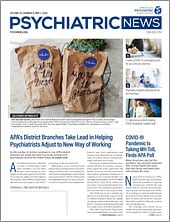Stephen Lieber, the chairman of the board of the Brain and Behavior Research Foundation (BBRF) and a tireless advocate for mental health research, passed away on March 31 at the age of 94. Along with his late wife, Constance, Stephen Lieber helped grow a modest philanthropic group known as the National Alliance for Research on Schizophrenia & Depression (NARSAD) into today’s BBRF—the largest private supporter of psychiatric research grants in the country.
“Steve’s legacy in our field is unparalleled. The research supported by BBRF and made possible by the leadership and generosity of Connie and Steve has had a direct impact on the practice of psychiatry,” said Jeffrey Borenstein, M.D., president and CEO of BBRF and editor-in-chief of Psychiatric News. “Their efforts to improve our understanding of the science of the brain has led to new treatments including transcranial magnetic stimulation and rapid-acting antidepressants.”
“I have lost many loved ones, but Steve’s passing just knocked me out,” added Herbert Pardes, M.D., the chair of BBRF’s Scientific Council and a past president of APA. “Over the 30 years I have known Steve, I have never met anyone as intelligent, decent, caring, selfless, and pleasurable to work with. In a word, he was extraordinary.”
Pardes recalled his first meeting with the Liebers back in 1985, when they approached him after a daylong program on mental illness he had hosted at Columbia University. “Their selfless character was evident from day one, when they modestly asked if they could help provide more national recognition for mental illness and the people living with it,” he said. “I cannot overstate how important Steve and Connie were to the foundation.”
The Liebers’ legacy goes beyond nearly three decades of leadership at BBRF. Their philanthropy helped create scientific institutions dedicated to unlocking the biological underpinnings of mental illness and improving patient care. These include the Lieber Recovery and Rehabilitation Clinic for Psychotic Disorders and the Lieber Schizophrenia Clinic at Columbia University, as well as the Lieber Institute for Brain Development (affiliated with Johns Hopkins University) in Baltimore.
“For me personally, Sundays will be very difficult for a while,” said Daniel Weinberger, M.D., director and CEO of the Lieber Institute. He had also known the Liebers since the mid-1980s. He told Psychiatric News that he spoke with Lieber every Sunday for the past decade to discuss, among other topics, how the institute was doing and share thoughts on new projects and ideas. “For someone without formal scientific training, he was exceptionally insightful about psychiatry. He was also a fountain of knowledge; he never stopped providing ideas for the institute, such as a digital newsletter we recently launched that has proven a success.”
“Steve and Connie Lieber were not only great philanthropists to BBRF but also advocates for mental health and substance use research and treatment,” said APA CEO and Medical Director Saul Levin, M.D., M.P.A. “I had the pleasure of sitting next to or near Steve at the BBRF awards ceremonies. He was an avid questioner about APA’s research activities, particularly the APA registry [PsychPRO], which he knew would someday be a valuable source of research data. He always had an appreciative word about all we were doing for our members and their patients. He will be sorely missed. However, his and Connie’s legacy will live on in the awards given into the future.” ■

